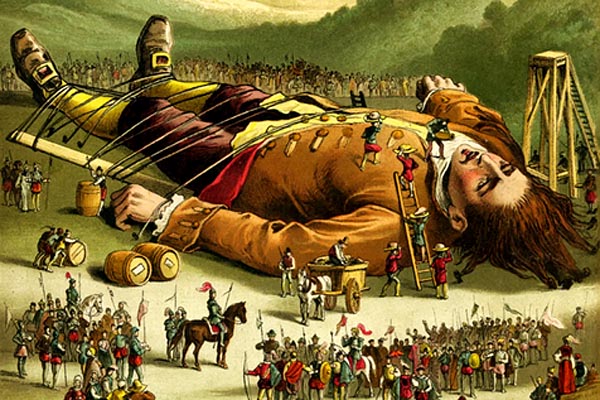 |
| Gulliver at the mercy of the Lilliputians (Wikipedia) |
Note: You might know about Gulliver among the Lilliputians (little people), but what about the giants? Or the talking horses? And how about those Yahoos?
Get Ready: What would it be like to be a giant--like twelve times larger than "normal" people--or a tiny person less than 1/10th normal size? What challenges would it present? What advantages?
Gulliver's Travels is a satirical novel by the Irish writer and minister Jonathan Swift. In the frame story, ship's captain Lemuel Gulliver is shipwrecked or marooned four times; the book, then, is written in four parts, each one of which is a commentary on some aspect of the society of Swift's day.
On his first disastrous journey (he had made several successful ones previously), the nearly-forty-year-old Gulliver is shipwrecked and wakes to find himself tied down by a nation of people less than six inches high. These are the Lilliputians, and Gulliver--after earning their confidence--becomes a trusted advisor to the king.
The people of Lilliput put an enormous amount of importance on trivial things, such as whether to break an egg at its larger or smaller end. (There was actually a civil war between the "Big-Endians" and the "Little-Endians"!)
At one point the capital catches fire and Gulliver--twelve times larger than the Lilliputians--urinates on the fire to put it out. For this and other "crimes" (urinating in public is illegal) he is charged with treason. Sentenced to be blinded (how would they kill him?) he escapes to the neighboring island of Blefuscu, Lilliput's sworn enemy--and there finds a human-sized boat which he rows out to a passing ship and thus returns home, with some Lilliputian animals to prove his story.
On his second such voyage, he becomes lost in North America and is left behind by his companions. He finds himself in the land of Brobdingnag, where the people are over 70 feet tall! Being smaller than others has its own challenges--he battles giant wasps, for example--and at last the house-like box he is kept in is seized by a giant eagle and dropped in the ocean, whence he is picked up by a ship and returned to England. The Brobdingnagians are far superior to the English morally, providing an opportunity for Swift to contrast proper behavior with that of his own society.
On his third journey, he is attacked by pirates who maroon him near India. An amazing flying island named Laputa, manned brilliant but useless scholars, rescues him. He also visits the ghosts of historical figures like Julius Caesar and Aristotle on the island of Glubbdubdrib, and meets immortals (they live forever but continue to age!) on Luggnagg before continuing on to Japan.
His fourth and final trip finds him stranded in the land of talking horses called the Houyhnhnms (a made-up word that sounds like the neigh of a horse). He is welcomed, although he is ultimately sent away because he resembles the race of deformed savage people called the Yahoos. His canoe is picked up by a Portuguese ship and he returns to England, where he becomes a recluse who avoids people but talks with horses several hours a day.
--------Read more: https://en.wikipedia.org/wiki/Gulliver%27s_Travels
Practice: Match the term to its definition below:
- deformed
- disastrous
- immortals
- morally
- neigh
- recluse
- savage
- treason
- urinates
- wasps
- the sound a horse makes
- a person who lives apart from society
- uncivilized
- regarding right and wrong
- makes water; "pees"
- a crime against the government
- people who live forever
- very unfortunate; tragic
- shaped wrongly
- stinging insects similar to bees
Answers are in the first comment below.
Submitted to the Shenzhen Daily for September 13, 2021


Answers to the Practice: 1. i; 2. h; 3. g; 4. d; 5. a; 6. b; 7. c; 8. f; 9. e; 10. j
ReplyDelete